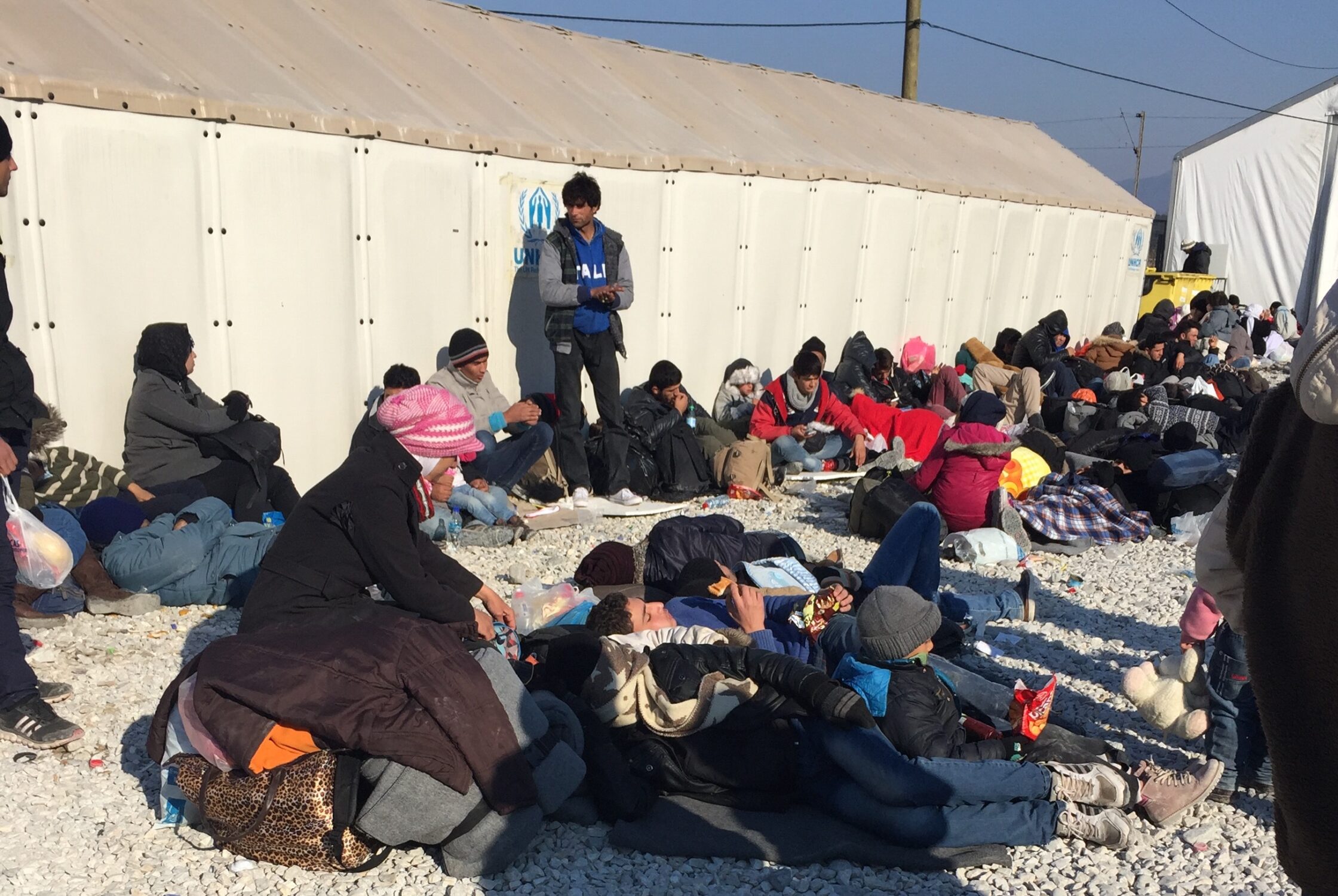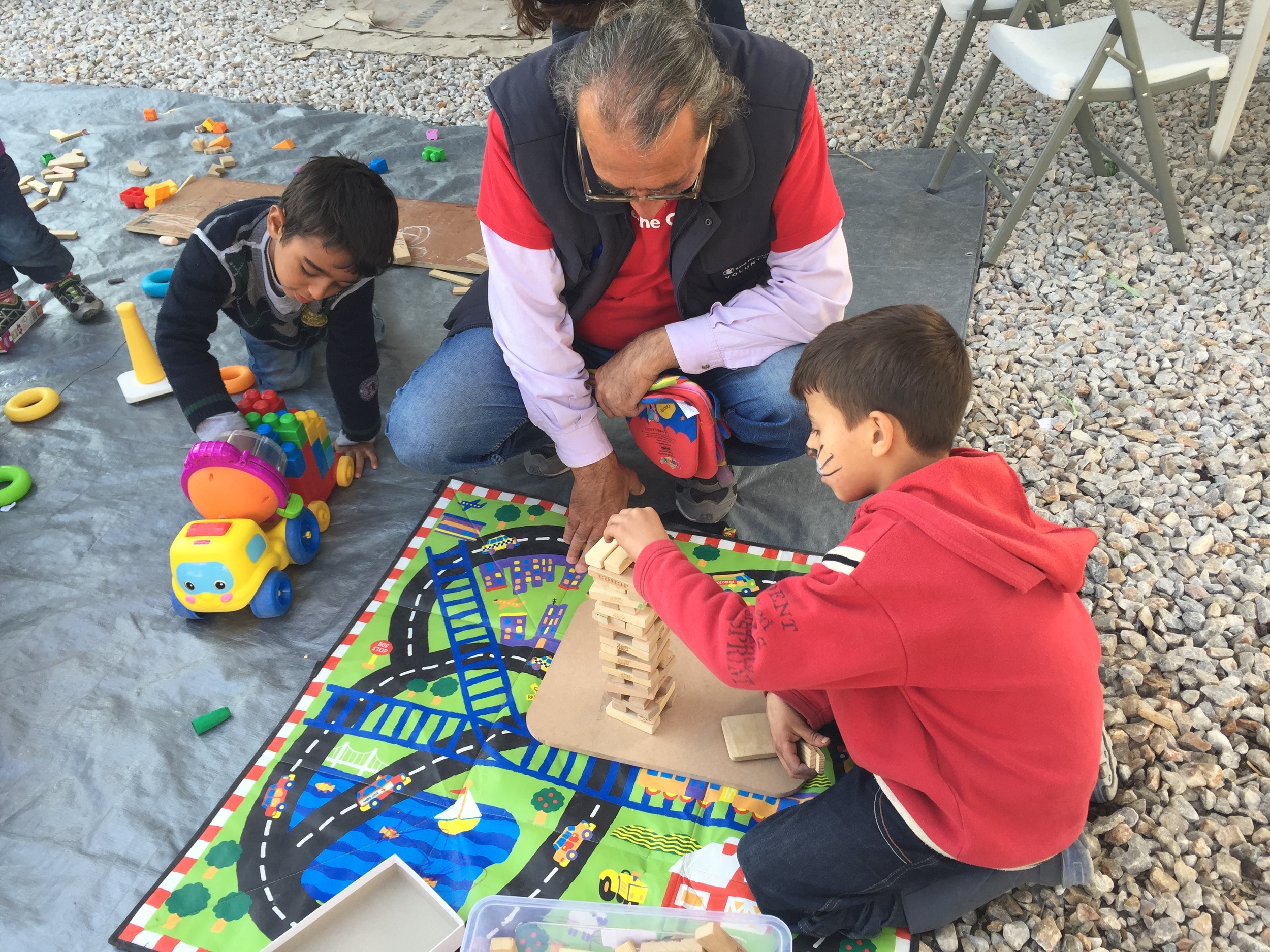The Great Walk Now or Never

The black rubber dinghy had just landed on Mytileni’s rocky beach on the Isle of Lesvos, Greece. The 41 people crammed precariously dropped their orange life jackets and looked around to make surefriends and relatives had gotten to shore.
A father knelt before his curly headed son, checked his clothing–damp, but not too wet–and tried to explain where they were. The boy smiled, then spent his time trying to get his heel back into his wet sneaker. I helped him as his father looked for his wife further down the beach.

The family had left Aleppo a week ago, waited three days on the Turkish coast and finally had safely reached the shores of Europe.
Along with the 760,000 people who’ve come through Greece since April, they were embarking on “The Great Walk,” or what some call “The Great Wait.” They hoped to make it to Germany. With winter coming and borders closing, it is a “now-or-never” journey as Europe absorbs the largest migration since World War II. Almost half come through Lesvos, 58% men, 16% women, 26% children, according to the United Nations High Commission on Refugees (UNHCR).
As Syrians, they are lucky, if having to flee one’s home destroyed in war can be considered luck. Most Syrian refugees– 96-98%– will find new residencies. Syrians comprise 45% of this exodus. Another third are Afghan, a tenth are Iraqi. The rest are Eritrean, Central African Republic, Iranian, Somalians, Moroccan, Algerians and others.
In the past month access for “direct arrivals” has closed. Only refugees from Syria, Iraq and Afghanistan are allowed the onward journey into Europe. The European Union (EU) has also agreed to accept 160,000 in a formal resettlement process, which takes 1-2 months and requires refugees to accept whatever country they’re assigned. Only Syrians, Iraqis, Eritreans, those from the Central African Republic and perhaps soon Afghans are included in this process, according to Alessandra Morelli, UNHCR Senior Operations Coordinator in Greece.
“History is passing in front of our eyes,” Ms. Morelli says. “I feel responsible that we build a Europe that is open and not one of walls.”
In the Lesvos registration site Kara Tepe I met with a group of 21 family and friends. They’d come through Lebanon from their village and were part of a small Shia sect of Alawites. The Assad forces had insisted the men join the Army, then ISIS arrived, kidnapping three girls, killingpeople and threatening thatif the men didn’t join and convert, they’d be killed.
“I fled not as a deserter, but because I didn’t want to fight,” said one of the fathers. “It was impossible to live in Syria any longer. Planes are constantly flying over; shooting is everywhere. Despite the difficultiesahead, we feel safe now. We’ve received good treatment here, enough to feel like human beings again. I want my children to be raised in Europe, out of all the bad complexities in my part of the world.”
It was impossible to live in Syria any longer. Planes are constantly flying over; shooting is everywhere. Despite the difficulties ahead, we feel safe now.
Harsh stories abound for each refugee, but there are also stories of hope. Volunteers from Greece and all over Europe have come to assist. Doctors Without Borders treat the sick, Clowns Without Borders entertain the children, Families Like Ours from Portugal provide tons of clothes, Green Helmets from Germany put in wooden floors in the tents, and Samaritans winterize the shelters. Spanish lifeguards wait on the beaches in wet suits, ready to rescue. A local Greek mother donated a stroller and wrote a letter to the mother who would receive it. Local and international NGOs, EU agencies, and since early fall, UNHCR are on the ground helping.

The priorities for the refugees are employment and education for their children. Their journeys, with variations, look like this: They arrive from Syria into one of the bordering countries—Iraq, Jordon, Lebanon or Turkey. They pay a smuggler and wait . From Turkey, they climb on a raft, often at night, risk the 4-6 mile trip, where shipwreckshave taken hundreds of lives.
When they land, they’re given food, water, the opportunity to shower, charge phones, and change into dry clothes. They’re bussed to registration centers, where their papers are checked, they are finger printed and given official documents. They continue to Athens on a ferry, which they must pay for. There they board buses to northern Greece and the Macedonian border. If they are Syrian, Iraqi or Afghan, they are allowed to cross. They walk to a registration tent, wait to register again, this time for Macedonian papers. At the centers, provisions and services are free. There are safe places and play spaces for women and children. They wait for a train; the train is not free. It will take them to Serbia, where they must again register for new documents. From there they get trains or buses to their next destinations as they make their journeysnorthward.
War is at their back. Their future is focused on their children. Their destinations are partly places of imagination, where they imagine jobs and schools and safety. But the triage is intensifying. Winter is coming. The European Union is paying Turkey three billion Euros to secure its borders and service the three million refugees in Turkey so that they stay.
This migration is changing the face of Europe and challenging the future of the European Union. “We need to manage borders, not close them,” insists Philippe Leclerc, the new UNHCR director in Greece.
As the sun sets, we drive from Macedonia back through the official checkpointto Thessalonica. When we cross into Greece, we find our car behind a caravan of busses filled with refugees and migrants being returned to Athens. Today was a police action that cleared the area called “the Green Field” where those not allowed to cross had started camping. These are not Syrians, Iraqis or Afghans, but all the other nationalities who hoped to pass into Europe. Nineteen hundred people in 49 buses will be put up for the night in Olympic facilities and in the morning told their options. Most will have to return to their countries.
Joanne Leedom-Ackerman serves on the board of Refugees International and recently returned from Greece and Macedonia with UNHCR.